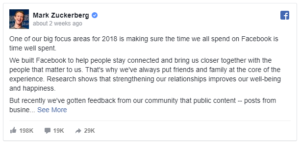Recently, Facebook’s CEO announced platform changes that will reduce News Feed content from businesses, brands and media to better connect users with friends and family. According to Zuckerberg, Facebook is focused on improving the experience by “helping users find relevant content to have more meaningful social interactions.” This change comes in response to community feedback and research analysis to continue making the social network an engaging platform.
While research from Social@Ogilvy estimated that the organic reach of branded content was already less than 2%, this new algorithm change has led to speculation and concern about the impact to brand marketers. Social media is still a critical component for integrated marketing communications plans, so how can we prepare? Here are some considerations for your marketing strategy:
Content Calendar
The good news is that marketers will be able to decrease the frequency of publishing on Facebook since organic content will not be seen by page followers. This will save creative resources needed to maintain daily content calendars. Some content will still be needed for page visitors. However, resources could be prioritized on creating engaging and quality content for dark posts to increase relevance to audiences.
Ad Spend
Advertising costs on Facebook have been relatively inexpensive compared to traditional and search advertising. Facebook ads operate on an auction system where advertisers compete for space based on factors like audience targeting, placement, relevance, and timing. As brands continue to compete for limited audience attention, these changes will decrease the available ad space and increase the cost for promoted content. This means that brands will need to allocate additional budget for Facebook advertising or find alternative channels for promotion.
Community Engagement
Because Facebook is committed to providing relevant content to users, the platform will continue to display posts that audiences will want to see. This means that engagement will help increase a post’s ranking in the News Feed. For marketers, this means that it will be more important to understand the needs of their target audiences and create content that engages these individuals. Engagement also happens through comments and shares, so marketers should encourage conversation by participating in conversations on the comment threads of brand posts.
Alternatives for Content Distribution
There will continue to be interest in news stories and content that entertains or adds value to users. Facebook’s News Feed changes will not stop people from seeking out this content, but this may result in users seeking alternative sources for this information. Knowing this may cause behavioral changes, marketers may want to adjust their integrated marketing communication plans to identify new ways to distribute content. For example, BuzzFeed started running ads on Facebook to direct audiences to use the company’s mobile app instead of Facebook. And, The New York Times is looking at ways to integrate virtual reality into their content distribution strategy.
This isn’t the first or last time that social networks will alter their platforms. Change is always scary, but this isn’t the end of the world for marketers. It is simply an opportunity to try something new. Brands who develop a relationship and build trust with consumers will continue to win.







7 Responses to About-Face: Time to rethink your Facebook marketing strategy